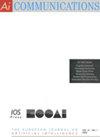Dependable learning-enabled multiagent systems
IF 1.4
4区 计算机科学
Q4 COMPUTER SCIENCE, ARTIFICIAL INTELLIGENCE
引用次数: 1
Abstract
We are concerned with the construction, formal verification, and safety assurance of dependable multiagent systems. For the case where the system (agents and their environment) can be explicitly modelled, we develop formal verification methods over several logic languages, such as temporal epistemic logic and strategy logic, to reason about the knowledge and strategy of the agents. For the case where the system cannot be explicitly modelled, we study multiagent deep reinforcement learning, aiming to develop efficient and scalable learning methods for cooperative multiagent tasks. In addition to these, we develop (both formal and simulation-based) verification methods for the neural network based perception agent that is trained with supervised learning, considering its safety and robustness against attacks from an adversarial agent, and other approaches (such as explainable AI, reliability assessment, and safety argument) for the analysis and assurance of the learning components. Our ultimate objective is to combine formal methods, machine learning, and reliability engineering to not only develop dependable learning-enabled multiagent systems but also provide rigorous methods for the verification and assurance of such systems.可靠的支持学习的多智能体系统
我们关注可靠的多智能体系统的构造、形式验证和安全保证。对于系统(代理及其环境)可以显式建模的情况,我们开发了几种逻辑语言(如时间认知逻辑和策略逻辑)的形式化验证方法,以对代理的知识和策略进行推理。对于系统无法明确建模的情况,我们研究了多智能体深度强化学习,旨在为合作多智能体任务开发高效且可扩展的学习方法。除此之外,我们还开发了(正式的和基于模拟的)验证方法,用于基于神经网络的感知代理,该感知代理接受监督学习训练,考虑其安全性和抗敌对代理攻击的鲁棒性,以及用于分析和保证学习组件的其他方法(如可解释的AI,可靠性评估和安全参数)。我们的最终目标是将形式化方法、机器学习和可靠性工程相结合,不仅开发可靠的支持学习的多智能体系统,而且还为此类系统的验证和保证提供严格的方法。
本文章由计算机程序翻译,如有差异,请以英文原文为准。
求助全文
约1分钟内获得全文
求助全文
来源期刊

AI Communications
工程技术-计算机:人工智能
CiteScore
2.30
自引率
12.50%
发文量
34
审稿时长
4.5 months
期刊介绍:
AI Communications is a journal on artificial intelligence (AI) which has a close relationship to EurAI (European Association for Artificial Intelligence, formerly ECCAI). It covers the whole AI community: Scientific institutions as well as commercial and industrial companies.
AI Communications aims to enhance contacts and information exchange between AI researchers and developers, and to provide supranational information to those concerned with AI and advanced information processing. AI Communications publishes refereed articles concerning scientific and technical AI procedures, provided they are of sufficient interest to a large readership of both scientific and practical background. In addition it contains high-level background material, both at the technical level as well as the level of opinions, policies and news.
 求助内容:
求助内容: 应助结果提醒方式:
应助结果提醒方式:


